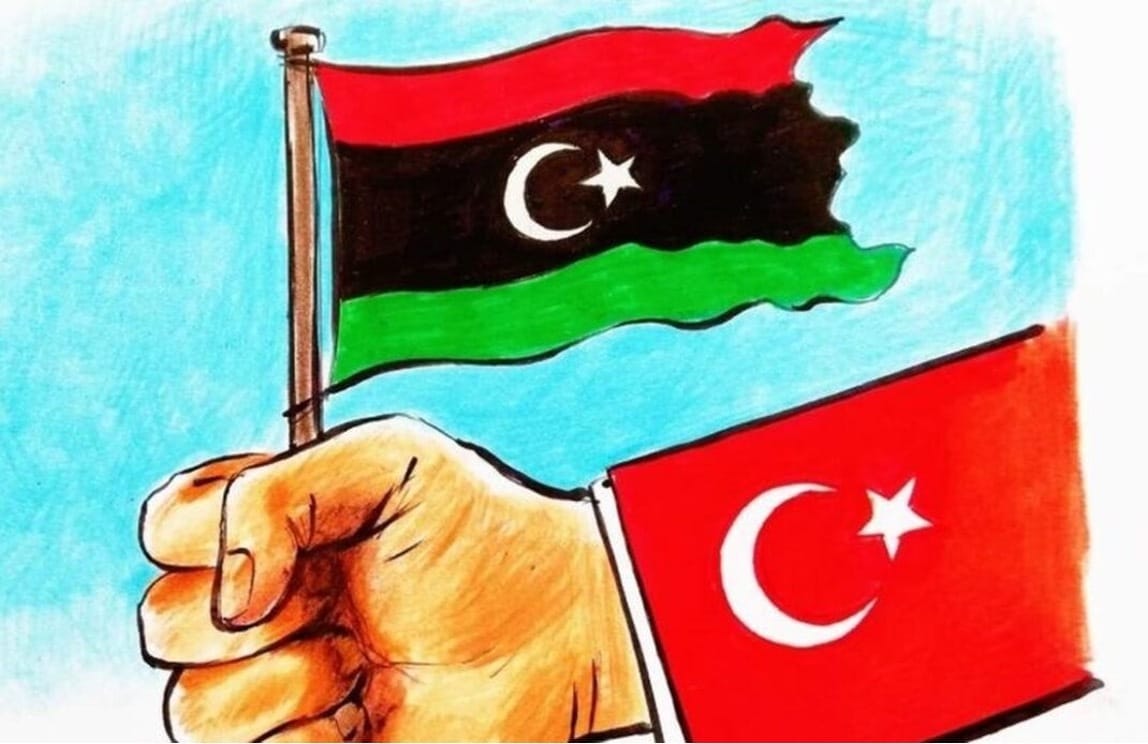|  | (Source: IARI) |
| Turkey and Libya have a long and complex relation. Their history, politics, and geography have tied them together for centuries. Today, their ties are shaped by energy, trade, security, and the search for influence. | A shared history | The ties between Turkey and Libya go back to the Ottoman Empire. Libya was once part of that Empire for more than three hundred years. Then Italy invaded it in 1911. This long rule left cultural and social ties between the two regions. Many in Libya still see Turkey as a familiar power. It is not just a foreign state. For Turkey, Libya is a place where it once had deep roots, and where it still feels it can play a key role. | Libya became an its own state in 1951. Turkey was one of the first to recognize it. During the rule of Muammar Gaddafi in Libya, relations went up and down. Sometimes they were friendly, mostly in trade and construction. Turkish companies helped build roads, houses, and airports in Libya. But Gaddafi's actions also caused tensions. Still, they managed to keep their connection alive for many years. | The Arab Spring and the civil war | The Arab Spring of 2011 changed everything. Protests and violence broke out in many Arab states. In Libya, the uprising led to the fall and death of Gaddafi. But his fall also caused a long civil war. Different groups, tribes, and militias fought for power. Libya split into two main parts: one government in the east, and another in the west. | Turkey chose to support the UN–recognized Government of National Accord (GNA) in Tripoli. The rival group was led by General Khalifa Haftar in the east. It got support from Egypt, the UAE, Russia, and France. This made Libya's war not just a local conflict, but a regional one. Other countries competed for power and resources. | Turkey played a big role in helping the Tripoli government survive. In late 2019, the GNA signed two important deals with Turkey. One was a military cooperation deal. The other was a maritime boundary deal that redefined parts of the Mediterranean Sea. These deals gave Turkey more rights to explore for oil and gas in the east of the Mediterranean. In return, Turkey sent drones, weapons, and military advisers to Libya. This support helped the GNA stop Haftar's attack on Tripoli a year later. | | | | Trump's Exec Order #14154 — A "Millionaire-Maker"
Donald Trump has cheated death.
He's overcome insane and criminal vote rigging.
And survived every indictment and impeachment thrown at him.
But his next move could make him a legend – and perhaps the most popular president in U.S. History.
Former Presidential Advisor, Jim Rickards says, "Trump is on the verge of accomplishing something no President has ever done before."
And if he's successful, it could kick off one of the greatest wealth booms in history.
We recently sat down with Rickards to capture all the key details on tape.
For the moment, you can watch this interview free of charge – just click here. |
|
| | Energy and the Mediterranean | Energy is a key part of Turkey's interest in Libya. The east part of the Mediterranean has become a key area for natural gas exploration. Greece, Cyprus, Egypt, and Israel have formed their own energy groups and deals. These often exclude Turkey. The deal with the GNA was Turkey's way of securing its place in this competition. It allowed Turkey to claim new areas of the sea that overlap with what Greece and Cyprus also claim. | This move caused tension with the UE and other states. But for Turkey, the deal was a way to protect its energy interests and its role as a regional power. Libya's long coastline and large oil reserves made it even more important. Turkish companies also hoped to return to Libya to rebuild infrastructure and invest in new projects once the fighting slowed down. | Security and influence | Turkey's involvement in Libya is not only about energy. It is also about security and influence. By supporting the Tripoli government, Turkey gained a strategic ally in North Africa. This gave Turkey a foothold on the Mediterranean, close to Europe and near key trade routes. It also allowed Turkey to counter rivals like Egypt and the UAE, who back the eastern side. | Turkey's use of drones and technology in Libya also showed its growing military power. The success of Turkish drones made them famous and helped boost Turkey's defense industry. At the same time, Turkey built military bases and trained Libyan forces. This created a lasting presence that continues even after the major fighting ended. | Challenges and opportunities | Despite its gains, Turkey faces many challenges in Libya. The state is still divided and unstable. There are rival governments and militias. The planned elections keep getting delayed. Foreign forces, including Turkish troops and Russian mercenaries, remain in the country. This makes peace difficult to achieve. | At the same time, Turkey must balance its interests carefully. It needs to maintain good relations with both local and global actors. EU countries and the U.S. want foreign troops to leave Libya. But Turkey fears losing its influence if it withdraws too soon. Also, Libya's internal divisions mean that Turkey cannot rely on one side forever. It needs to build trust with all groups to protect its long-term goals. | Still, there are opportunities. Libya's need for rebuilding offers economic openings for Turkish companies. The two countries continue to sign new trade and investment deals. If peace holds, Turkey could play a big part in Libya's reconstruction, from housing to energy and infrastructure. | Decoding geopolitics isn't a job. It's survival. | Joy |
|
Post a Comment
Post a Comment